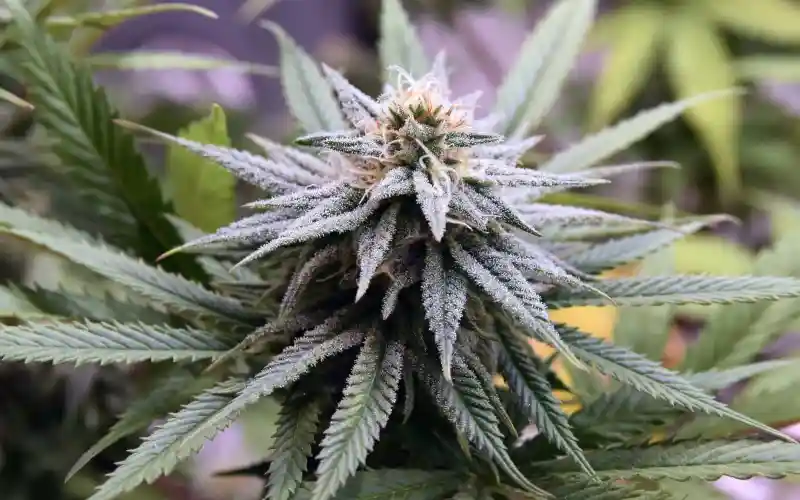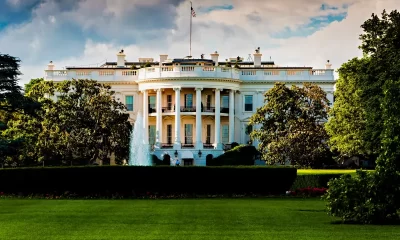Business
U.S. Department of Justice Extends Pardon Certificate Comment Deadline to August 15

The DOJ is requesting a deadline extension for public comment in relation to cannabis conviction pardons.
The U.S. Department of Justice (DOJ) announced in March that it was officially opening up an online portal to make it easier than ever for those who hold low-level cannabis convictions to apply for a pardon. Now the DOJ’s Office of the Pardon Attorney published a notice on July 18 stating that the deadline has been extended until August 15.
The Office of the Pardon Attorney wrote that it is submitting a request to extend pardon applications through 2026. “DOJ seeks PRA [Paperwork Reduction Act] authorization for this information collection for three (3) years,” it stated. “OMB [Office of Management and Budget] authorization for an ICR [Information Collection Request] cannot be for more than three (3) years without renewal. The DOJ notes that information collection requirements submitted to the OMB for existing ICRs receive a month-to-month extension while they undergo review.”
“The purpose of this collection is to gather information necessary to enable the Office of the Pardon Attorney, U.S. Department of Justice to expeditiously administer the provisions of the Executive Order 10467, a proclamation granting pardons to individuals charged or convicted of simple possession of marijuana,” the notice stated. “The collection will enable individuals to apply for certificates of pardon, restoring political, civil, and other rights by implementing a process to provide certificates of pardon as provided by the order.”
The DOJ expects 20,000 people to apply for a pardon and complete the necessary information, which includes personal information (name, mailing address, email address, and citizenship status) as well as individual docket and case number, the code section for the charge, copies of all relevant documents (such as indictments, complaints, or other conviction documents), and the date the sentence was imposed.
This pardon directive was enacted by President Joe Biden in October 2022. “As I’ve said before, no one should be in jail just for using or possessing marijuana,” Biden tweeted. “Today, I’m taking steps to end our failed approach.”
The DOJ explained in March what makes a person eligible for a pardon. “Those who were pardoned on Oct. 6, 2022, are eligible for a certificate of pardon,” the DOJ wrote in a press release. “Consistent with the proclamation, to be eligible for a certificate, an applicant must have been charged or convicted of simple possession of marijuana in either a federal court or D.C. Superior Court, and the applicant must have been lawfully within the United States at the time of the offense.”
Following Biden’s pardon announcement, the U.S. Sentencing Commission announced that more than 1,450 people in Arizona with federal cannabis possession charges would be pardoned. The only state to receive more pardons is California, with 1,550 eligible people. However, the pardons do not affect those whose convictions include selling cannabis illegally.
The U.S. Department of Health and Human Services and U.S. Food and Drug Administration (FDA) are currently working on an eight-step federal cannabis scheduling review to determine if cannabis should be rescheduled under the Controlled Substances Act. However, there is no definitive deadline that marks when these agencies will complete the review. If or when it is finished however, it would be sent to the Drug Enforcement Administration for final decisions.
Recently, officials in multiple states, including Illinois, Maryland, Massachusetts, Minnesota, and Utah, sent data to the FDA regarding their medical cannabis programs with the intention of contributing to the review.
Federal rescheduling or descheduling cannabis could open up many opportunities for cannabis consumers and businesses. Just recently, cannabis businesses in Vermont were informed that they were not eligible for federal emergency aid, due to cannabis being a Schedule I substance, when powerful storms caused flooding throughout the state and harmed their businesses and livelihood.
Business
New Mexico cannabis operator fined, loses license for alleged BioTrack fraud

New Mexico regulators fined a cannabis operator nearly $300,000 and revoked its license after the company allegedly created fake reports in the state’s traceability software.
The New Mexico Cannabis Control Division (CCD) accused marijuana manufacturer and retailer Golden Roots of 11 violations, according to Albuquerque Business First.
Golden Roots operates the The Cannabis Revolution Dispensary.
The majority of the violations are related to the Albuquerque company’s improper use of BioTrack, which has been New Mexico’s track-and-trace vendor since 2015.
The CCD alleges Golden Roots reported marijuana production only two months after it had received its vertically integrated license, according to Albuquerque Business First.
Because cannabis takes longer than two months to be cultivated, the CCD was suspicious of the report.
After inspecting the company’s premises, the CCD alleged Golden Roots reported cultivation, transportation and sales in BioTrack but wasn’t able to provide officers who inspected the site evidence that the operator was cultivating cannabis.
In April, the CCD revoked Golden Roots’ license and issued a $10,000 fine, according to the news outlet.
The company requested a hearing, which the regulator scheduled for Sept. 1.
At the hearing, the CCD testified that the company’s dried-cannabis weights in BioTrack were suspicious because they didn’t seem to accurately reflect how much weight marijuana loses as it dries.
Company employees also poorly accounted for why they were making adjustments in the system of up to 24 pounds of cannabis, making comments such as “bad” or “mistake” in the software, Albuquerque Business First reported.
Golden Roots was fined $298,972.05 – the amount regulators allege the company made selling products that weren’t properly accounted for in BioTrack.
The CCD has been cracking down on cannabis operators accused of selling products procured from out-of-state or not grown legally:
- Regulators alleged in August that Albuquerque dispensary Sawmill Sweet Leaf sold out-of-state products and didn’t have a license for extraction.
- Paradise Exotics Distro lost its license in July after regulators alleged the company sold products made in California.
Golden Roots was the first alleged rulebreaker in New Mexico to be asked to pay a large fine.
Source: https://mjbizdaily.com/new-mexico-cannabis-operator-fined-loses-license-for-alleged-biotrack-fraud/
Business
Marijuana companies suing US attorney general in federal prohibition challenge

Four marijuana companies, including a multistate operator, have filed a lawsuit against U.S. Attorney General Merrick Garland in which they allege the federal MJ prohibition under the Controlled Substances Act is no longer constitutional.
According to the complaint, filed Thursday in U.S. District Court in Massachusetts, retailer Canna Provisions, Treevit delivery service CEO Gyasi Sellers, cultivator Wiseacre Farm and MSO Verano Holdings Corp. are all harmed by “the federal government’s unconstitutional ban on cultivating, manufacturing, distributing, or possessing intrastate marijuana.”
Verano is headquartered in Chicago but has operations in Massachusetts; the other three operators are based in Massachusetts.
The lawsuit seeks a ruling that the “Controlled Substances Act is unconstitutional as applied to the intrastate cultivation, manufacture, possession, and distribution of marijuana pursuant to state law.”
The companies want the case to go before the U.S. Supreme Court.
They hired prominent law firm Boies Schiller Flexner to represent them.
The New York-based firm’s principal is David Boies, whose former clients include Microsoft, former presidential candidate Al Gore and Elizabeth Holmes’ disgraced startup Theranos.
Similar challenges to the federal Controlled Substances Act (CSA) have failed.
One such challenge led to a landmark Supreme Court decision in 2005.
In Gonzalez vs. Raich, the highest court in the United States ruled in a 6-3 decision that the commerce clause of the U.S. Constitution gave Congress the power to outlaw marijuana federally, even though state laws allow the cultivation and sale of cannabis.
In the 18 years since that ruling, 23 states and the District of Columbia have legalized adult-use marijuana and the federal government has allowed a multibillion-dollar cannabis industry to thrive.
Since both Congress and the U.S. Department of Justice, currently headed by Garland, have declined to intervene in state-licensed marijuana markets, the key facts that led to the Supreme Court’s 2005 ruling “no longer apply,” Boies said in a statement Thursday.
“The Supreme Court has since made clear that the federal government lacks the authority to regulate purely intrastate commerce,” Boies said.
“Moreover, the facts on which those precedents are based are no longer true.”
Verano President Darren Weiss said in a statement the company is “prepared to bring this case all the way to the Supreme Court in order to align federal law with how Congress has acted for years.”
While the Biden administration’s push to reschedule marijuana would help solve marijuana operators’ federal tax woes, neither rescheduling nor modest Congressional reforms such as the SAFER Banking Act “solve the fundamental issue,” Weiss added.
“The application of the CSA to lawful state-run cannabis business is an unconstitutional overreach on state sovereignty that has led to decades of harm, failed businesses, lost jobs, and unsafe working conditions.”
Business
Alabama to make another attempt Dec. 1 to award medical cannabis licenses

Alabama regulators are targeting Dec. 1 to award the first batch of medical cannabis business licenses after the agency’s first two attempts were scrapped because of scoring errors and litigation.
The first licenses will be awarded to individual cultivators, delivery providers, processors, dispensaries and state testing labs, according to the Alabama Medical Cannabis Commission (AMCC).
Then, on Dec. 12, the AMCC will award licenses for vertically integrated operations, a designation set primarily for multistate operators.
Licenses are expected to be handed out 28 days after they have been awarded, so MMJ production could begin in early January, according to the Alabama Daily News.
That means MMJ products could be available for patients around early March, an AMCC spokesperson told the media outlet.
Regulators initially awarded 21 business licenses in June, only to void them after applicants alleged inconsistencies with how the applications were scored.
Then, in August, the state awarded 24 different licenses – 19 went to June recipients – only to reverse themselves again and scratch those licenses after spurned applicants filed lawsuits.
A state judge dismissed a lawsuit filed by Chicago-based MSO Verano Holdings Corp., but another lawsuit is pending.
Source: https://mjbizdaily.com/alabama-plans-to-award-medical-cannabis-licenses-dec-1/
-

 Business2 years ago
Business2 years agoPot Odor Does Not Justify Probable Cause for Vehicle Searches, Minnesota Court Affirms
-

 Business2 years ago
Business2 years agoNew Mexico cannabis operator fined, loses license for alleged BioTrack fraud
-

 Business2 years ago
Business2 years agoAlabama to make another attempt Dec. 1 to award medical cannabis licenses
-

 Business2 years ago
Business2 years agoWashington State Pays Out $9.4 Million in Refunds Relating to Drug Convictions
-

 Business2 years ago
Business2 years agoMarijuana companies suing US attorney general in federal prohibition challenge
-

 Business2 years ago
Business2 years agoLegal Marijuana Handed A Nothing Burger From NY State
-

 Business2 years ago
Business2 years agoCan Cannabis Help Seasonal Depression
-

 Blogs2 years ago
Blogs2 years agoCannabis Art Is Flourishing On Etsy













